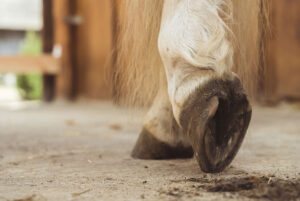Should I Deworm My Horse in the Winter?
- Topics: Article, Deworming & Internal Parasites, Winter Care

A: Yes, you are correct that we recommend deworming horses during the active grazing season rather than during the winter. The reason is that the small strongyles tend to arrest their development over the winter at the larval stage. Most of the available dewormers have no effect against these arrested larvae, and the few that do are only partially effective.
The arrested development can lead to an accumulation of small strongyle larvae in the mucosal walls of the large intestine. If a large number of these larvae are present in a horse, deworming it at this time might actually cause more harm than good. Most dewormers mainly act on the adult parasites present in the lumen of the intestine, and removing these may activate the arrested larvae and cause them to mass emerge from their encysted stage. This can lead to serious diarrhea.
There are situations where it can be necessary to deworm a horse during the winter months, such as if the horse hasn’t been dewormed adequately during the latter part of the grazing season. Other examples of winter deworming include foals that harbor ascarid parasites, which aren’t seasonal to the same extent as the strongyles. In both cases you should consult with your veterinarian regarding your choice of dewormer
Create a free account with TheHorse.com to view this content.
TheHorse.com is home to thousands of free articles about horse health care. In order to access some of our exclusive free content, you must be signed into TheHorse.com.
Start your free account today!
Already have an account?
and continue reading.

Related Articles
Stay on top of the most recent Horse Health news with


















